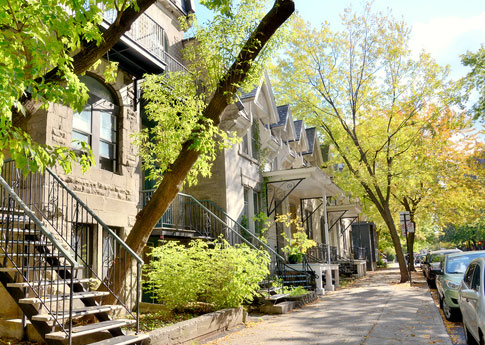Home insurance for fires: How does it work?

In Quebec, property damage due to fire is covered by your home insurance policy. But what happens if your garage catches fire, or your trailer? What if a guest caused the fire?
Think about your safety first
Remember that you generally have less than 3 minutes to get out of a burning house. Those few minutes include the time it takes for the smoke detector to sense the smoke, for the alarm to sound, and for it to wake you up if the fire starts in the middle of the night. As soon as you see the first signs of a fire, your top priority should be getting yourself and your family to safety. Do not attempt to extinguish the fire yourself.
What exactly does home insurance cover?

In Quebec, all accidental property damage caused by a fire is usually covered by your home insurance policy, unless the insurer requires an exclusion for this type of loss (e.g., in remote areas). This kind of damage may be caused by such things as:
- A kitchen fire
- An electrical fire (e.g., toaster)
- A chimney fire
- Flammable materials in your yard (e.g., a cigarette butt in your flowerpot)
- Lightning striking your home and causing a fire
- A fire following an earthquake
- A propane tank explosion
Good to know: The property that causes the loss is never covered. For example, if your unattended stove catches fire, everything that is destroyed will be replaced, except for the stove, which you will have to replace yourself.

The insurer will pay for the value of your property (depending on the policy, either its value new or its value on the day of the loss) and the repair/reconstruction of your home if you own it. This coverage applies even if the incident was caused by your own negligence, as well as in the event of arson. So be honest when you make your claim.
Depending on your age, some insurers, including CAA-Quebec, will give you the option of rebuilding your home or receiving an amount equal to its value to buy, for example, a condo instead. If you choose to remain in your home, your “living expenses” coverage will cover the additional costs of relocation while repairs are being carried out. In such cases, the insurer is careful to relocate families within the same geographic area so that, for example, children can stay close to their school.
Tips for ensuring you’re fully covered
Remember to keep proofs of purchase for all your assets and keep your insurer up to date on the total value of what you own. Always inform your insurer when you install a backup heater like a fireplace or gas stove.
Planning a move? Insure your property and your home from day one, whether it’s a condo, an apartment, or a house, and regardless of whether you’re a tenant or the owner. Requesting a quote is relatively simple as long as you have all the information about your dwelling at hand. Answer the questions honestly. Lying might save you money on your premiums, but it could also deprive you of full coverage in the event of an accident.
Situations to consider
What happens if I don’t own my home?
Most financial institutions require proof of home insurance before approving a mortgage. Tenants are not always subject to the same requirement. If you think you don’t own anything worth insuring, keep in mind that replacing everything after a fire is expensive. There’s also the fact that home insurance includes liability coverage. This is very useful if you accidentally cause bodily harm or property damage to others.
What happens if a guest sets my house on fire?
Let’s say you have guests visiting and one of them accidentally starts a fire with a cigarette butt. What happens then? Your insurer will cover the damages up front, but will then turn to your guest’s insurer to be reimbursed for the cost of damages caused by their insured. So the damage is ultimately covered by the liability insurance of the person responsible for the fire. If your guest doesn’t have home insurance, your home insurer may sue them personally or forego the process if the probability of recovering the costs is too low.
What happens if my house burns down while it’s under construction?
If a fire occurs in a home under construction, the general contractor’s insurance will cover the damage. If you choose to self-build, notify your home insurer before the work begins and provide clear details on your project. You should also consider insuring all the people who will help you out as volunteers on the job site by offering them, for example, accident insurance if they don’t have that kind of coverage through their group insurance.
What happens if my shed or garage catches fire?
Sheds and garages are covered by home insurance policies. Any auxiliary heaters in these outbuildings must be reported to the insurer. If you do hobby work that involves mechanics, or other activities that involve flammable products, your home insurance will cover any related claims. But if you do this work professionally, it is imperative that you inform your insurer so they can provide you with the necessary coverage, as this is an aggravation of risk. In such cases, your insurance premium could go up or your insurer could recommend purchasing an insurance policy that covers business risks.
What happens if my trailer catches fire while I’m camping?
First, you are required by law to have liability insurance for a minimum of $50,000 for any recreational vehicle. After that, you’ll have to purchase the appropriate policy depending on how you use your trailer. If your trailer is towed (you move it on the roads and it must be registered), you must insure it with an auto insurance policy, just like a vehicle. In the event of fire damage, your auto insurer will cover the costs. If your trailer is stationary (parked in a campground and not registered), you must insure it with a home insurance policy, like a secondary residence. In fact, a lot of campgrounds require proof of insurance from all their seasonal campers. This is the protection that will pay for any fire damage.
What happens if my cottage is far from emergency services?
Insurance companies calculate premiums based on the location of the home and property values in the neighbourhood, among other factors. Fire departments in remote areas are fewer and farther between than in urban is areas. Before applying for insurance, contact the municipality to find out where the nearest fire department is and how long it would take, on average, for firefighters to get to your home. Equip yourself accordingly: sprinklers, water tanks, etc. You should also check with the previous owner to find out how much their insurance premium was and under what conditions they were insured. This will save you time when researching your options.
It pays to have a good credit score!
Did you know that your credit score is a significant variable in determining your home insurance premium? People with good credit scores have been shown to be more likely to look after their residence well and, as a result, better prevent loss and damage.

Protect your home
See how CAA-Quebec Home Insurance can meet all your needs.